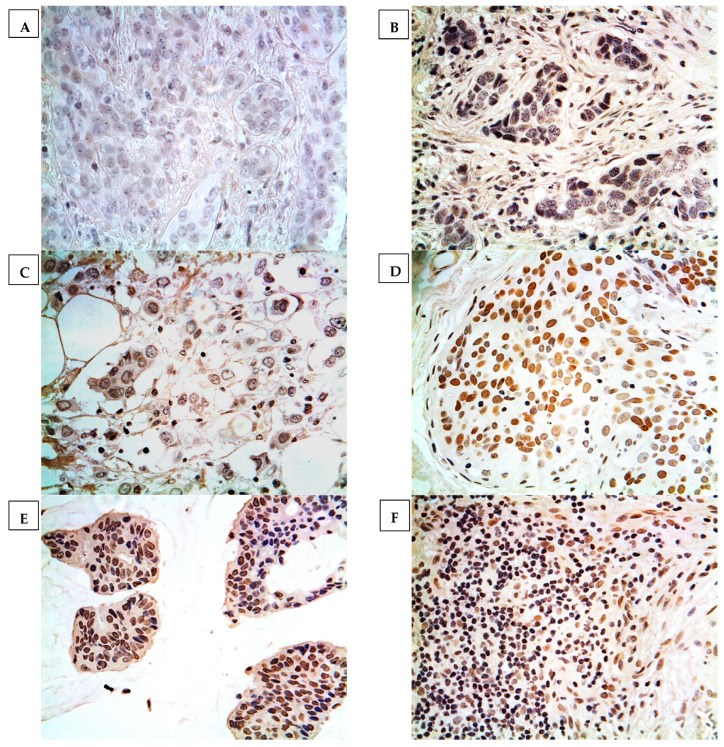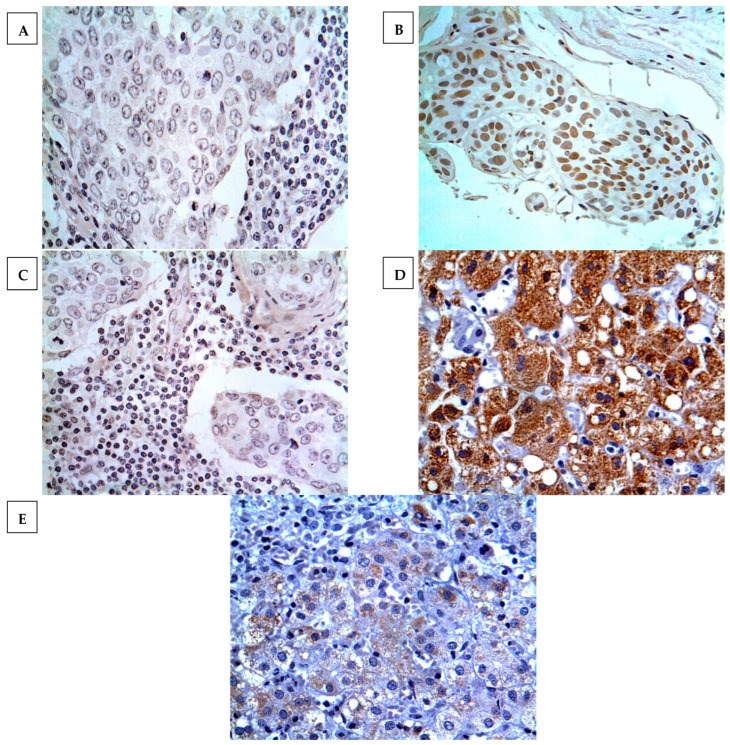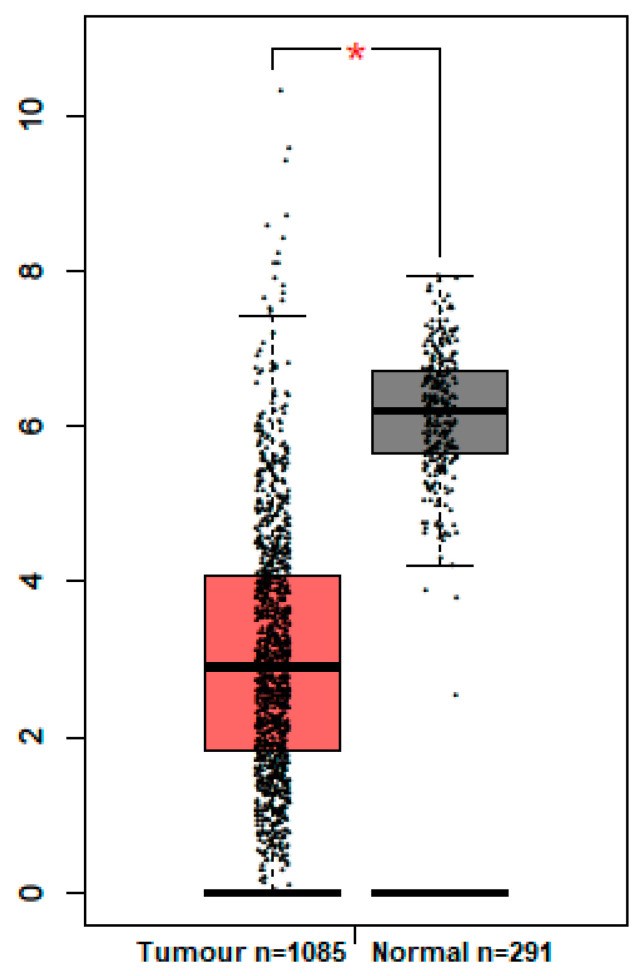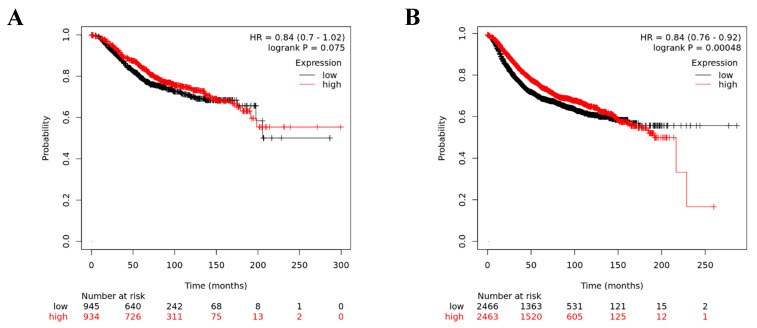Glypican-3 Differentiates Intraductal Carcinoma and Paget's Disease from Other Types of Breast Cancer
Affiliations
Affiliations
- Department of Medical Laboratory Technology, Faculty of Health Sciences, The Public Authority for Applied Education and Training, Shuwaikh, Kuwait City 15432, Kuwait.
- Faculty of Medicine, Mutah University, P.O. Box 7, Al-Karak 61710, Jordan.
- Faculty of Medicine, Jordan University of Science and Technology, Irbid 22110, Jordan.
- Faculty of Medicine, Hashemite University, Zarqa 13133, Jordan.
- Al-Karak Governmental Hospital, Ministry of Health, Al-Karak 11118, Jordan.
- Department of Internal Medicine, King Abdullah University Hospital, Irbid 22110, Jordan.
- Faculty of Pharmacy, Yarmouk University, Irbid 21163, Jordan.
- Department of Biochemistry and Molecular Biology, Faculty of Medicine, Mutah University, P.O. Box 7, Al-Karak 61710, Jordan.
- Department of Pharmacology, Faculty of Medicine, Mutah University, P.O. Box 7, Al-Karak 61710, Jordan
Abstract
Background and Objectives: breast cancer remains the most common health burden affecting females worldwide. Despite developments in breast cancer diagnostic approaches and treatment strategies, the clinical management of metastatic breast cancer remains challenging. Thus, there is a need to identify new biomarkers and novel drug targets for breast cancer diagnosis and therapy. Recently, aberrant glypican-3 (GPC3) expression in cancers has gained considerable interest in cancer research. The studies, however, have yielded contradictory results about GPC3 expression in breast cancer. Therefore, the current study aims to analyse GPC3 expression across a large panel of different breast cancer subtypes. Materials and Methods: GPC3 expression was immunohistochemically evaluated in 230 breast cancer patients along with eight normal tissues and its associations to clinical and demographic characteristics, as well as immunohistochemical biomarkers for breast cancer. Moreover, a public database consisting of breast cancer patients' survival data and GPC3 gene expression information was used to assess the prognostic value of GPC3 in the survival of breast cancer patients. Results: GPC3 expression was only characterised in 7.5% of different histological breast cancer subtypes. None of the normal breast tissues displayed GPC3 expression. Interestingly, all cases of Paget's disease, as well as 42.9% of intraductal and 16.7% of mucinous carcinomas were found to have GPC3 expression, where it was able to significantly discriminate Paget's disease and intraductal carcinoma from other breast cancer subtypes. Importantly, GPC3 expression was found more often in tumours that tested positive for the expression of hormone receptors and human epidermal growth factor receptor 2 (HER2), indicating more favourable histological subtypes of breast cancer. Consequently, longer relapse-free survival (RFS) was significantly correlated with higher GPC3 mRNA expression. Conclusions: Our study proposes that GPC3 is a promising breast cancer subtype-specific biomarker. Moreover, GPC3 may have the potential to be a molecular target for the development of new therapeutics for specific subtypes of breast cancer.
Keywords: biomarker; breast cancer; glypican-3; immunohistochemistry; prognosis.
Conflict of interest statement
The authors declare no conflict of interest.
Figures
Similar articles
Grillo PK, Győrffy B, Götte M.J Cancer Res Clin Oncol. 2021 Jul;147(7):1937-1955. doi: 10.1007/s00432-021-03597-4. Epub 2021 Mar 19.PMID: 33742285 Free PMC article.
Jeon Y, Kim H, Jang ES, Hong S, Kim JW, Yoon YS, Cho JY, Han HS, Jeong SH.APMIS. 2016 Mar;124(3):208-15. doi: 10.1111/apm.12491. Epub 2016 Jan 13.PMID: 26764243
Glypican-3 expression and its relationship with recurrence of HCC after liver transplantation.
Wang YL, Zhu ZJ, Teng DH, Yao Z, Gao W, Shen ZY.World J Gastroenterol. 2012 May 21;18(19):2408-14. doi: 10.3748/wjg.v18.i19.2408.PMID: 22654434 Free PMC article.
Pu Q, Zhao Q, Gao D.World J Surg Oncol. 2022 Sep 6;20(1):285. doi: 10.1186/s12957-022-02746-4.PMID: 36064544 Free PMC article. Review.
Glypican-3: a new target for cancer immunotherapy.
Ho M, Kim H.Eur J Cancer. 2011 Feb;47(3):333-8. doi: 10.1016/j.ejca.2010.10.024. Epub 2010 Nov 26.PMID: 21112773 Free PMC article. Review.
KMEL References
References
-
- Al-Saraireh Y.M., Alshammari F.O., Youssef A.M., Al-Sarayreh S., Al-Sarayra Y.M., Aborajooh E., Al-Shuneigat J., Alrawashdeh H.M. Screening of Glypican-6 Expression in Benign, Primary and Metastatic Colon Cancers. Clin. Med. Insights Oncol. 2021;15:11795549211036419. doi: 10.1177/11795549211036419. - DOI - PMC - PubMed
-
- Al-Saraireh Y., Alrawashdeh F., Al-Shuneigat J., Alsbou M., Alnawaiseh N., Al-Shagahin H. Screening of Glypican-3 Expression in Human Normal versus Benign and Malignant Tissues: A Comparative Study Glypican-3 expression in cancers. Biosci. Biotechnol. Res. Asia. 2016;13:687–692. doi: 10.13005/bbra/2085. - DOI
-
- Al-Saraireh Y.M., Haddadin W.J., Alboaisa N.S., Youssef A.M., Alsbou M.S., Al-Shuneigat J.M., Makeen H.A., Al-Shagahin H.M. Glypican-3 expression in primary and metastatic neuroblastoma. Jordan J. Biol. Sci. 2016;9:4.
-
- Castillo L.F., Lago Huvelle M.A., Fujita A., Maia Lobba A.R., Tascón R.S., Romera Garcia T., Armanasco E., Bagnoli F., Oliveira V.M.d., Longo Galvão M.A. Expression of Glypican-3 (GPC3) in malignant and non-malignant human breast tissues. Open Cancer J. 2015;8:12–23. doi: 10.2174/1874079001508010012. - DOI
-
- Baumhoer D., Tornillo L., Stadlmann S., Roncalli M., Diamantis E.K., Terracciano L.M. Glypican 3 expression in human nonneoplastic, preneoplastic, and neoplastic tissues: A tissue microarray analysis of 4,387 tissue samples. Am. J. Clin. Pathol. 2008;129:899–906. doi: 10.1309/HCQWPWD50XHD2DW6. - DOI - PubMed
-
- Moek K.L., Fehrmann R.S.N., van der Vegt B., de Vries E.G.E., de Groot D.J.A. Glypican 3 Overexpression across a Broad Spectrum of Tumor Types Discovered with Functional Genomic mRNA Profiling of a Large Cancer Database. Am. J. Pathol. 2018;188:1973–1981. doi: 10.1016/j.ajpath.2018.05.014. - DOI - PubMed
-
- Scully O.J., Bay B.-H., Yip G., Yu Y. Breast Cancer Metastasis. Cancer Genom.-Proteom. 2012;9:311–320. - PubMed
-
- Al-Saraireh Y.M., Alboaisa N.S., Alrawashdeh H.M., Hamdan O., Al-Sarayreh S., Al-Shuneigat J.M., Nofal M.N. Screening of cytochrome 4Z1 expression in human non-neoplastic, pre-neoplastic and neoplastic tissues. Ecancermedicalscience. 2020;14:1114. doi: 10.3332/ecancer.2020.1114. - DOI - PMC - PubMed
-
- Al-Saraireh Y.M., Alshammari F., Youssef A.M.M., Al-Sarayra Y.M., Al-Saraireh R.A., Al-Muhaisen G.H., Al-Mahdy Y.S., Al-Kharabsheh A.M., Abufraijeh S.M., Alrawashdeh H.M. Cytochrome 4Z1 Expression Is Correlated with Poor Prognosis in Patients with Cervical Cancer. Curr. Oncol. 2021;28:3573–3584. doi: 10.3390/curroncol28050306. - DOI - PMC - PubMed
-
- Al-Saraireh Y.M., Alshammari F., Youssef A.M.M., Al-Tarawneh F., Al-Sarayreh S., Almuhaisen G.H., Satari A.O., Al-Shuneigat J., Alrawashdeh H.M. Cytochrome 4Z1 Expression is Associated with Unfavorable Survival in Triple-Negative Breast Cancers. Breast Cancer. 2021;13:565–574. doi: 10.2147/BCTT.S329770. - DOI - PMC - PubMed
-
- Al-Saraireh Y.M., Alshammari F., Youssef A.M.M., Al-Sarayreh S., Almuhaisen G.H., Alnawaiseh N., Al-Shuneigat J.M., Alrawashdeh H.M. Cytochrome 4Z1 Expression is Associated with Poor Prognosis in Colon Cancer Patients. OncoTargets Ther. 2021;14:5249–5260. doi: 10.2147/OTT.S332037. - DOI - PMC - PubMed
-
- Al-Saraireh Y.M., Alshammari F., Satari A.O., Al-Mahdy Y.S., Almuhaisen G.H., Abu-Azzam O.H., Uwais A.N., Abufraijeh S.M., Al-Kharabsheh A.M., Al-Dalain S.M., et al. Cytochrome 4Z1 Expression Connotes Unfavorable Prognosis in Ovarian Cancers. Medicina. 2022;58:1263. doi: 10.3390/medicina58091263. - DOI - PMC - PubMed
-
- Al-Saraireh Y., Haddadin W., Alboaisa N., Alarjat J., Al-Shuneigat J., Alnawaiseh N. Expression of Chemokine Receptor CXCR4 in Primary and Metastatic Neuroblastoma Expression of CXCR4 in Neuroblastoma. Biomed. Pharmacol. J. 2016;9:425–431. doi: 10.13005/bpj/955. - DOI
-
- Yan P.S., Chen C.M., Shi H., Rahmatpanah F., Wei S.H., Caldwell C.W., Huang T.H. Dissecting complex epigenetic alterations in breast cancer using CpG island microarrays. Cancer Res. 2001;61:8375–8380. - PubMed
-
- Castillo L.F., Tascón R., Lago Huvelle M.A., Novack G., Llorens M.C., Dos Santos A.F., Shortrede J., Cabanillas A.M., Bal de Kier Joffé E., Labriola L., et al. Glypican-3 induces a mesenchymal to epithelial transition in human breast cancer cells. Oncotarget. 2016;7:60133–60154. doi: 10.18632/oncotarget.11107. - DOI - PMC - PubMed
-
- Fernández-Vega I., García O., Crespo A., Castañón S., Menéndez P., Astudillo A., Quirós L.M. Specific genes involved in synthesis and editing of heparan sulfate proteoglycans show altered expression patterns in breast cancer. BMC Cancer. 2013;13:24. doi: 10.1186/1471-2407-13-24. - DOI - PMC - PubMed
-
- Liu J.-Q., Liao X.-W., Wang X.-K., Yang C.-K., Zhou X., Liu Z.-Q., Han Q.-F., Fu T.-H., Zhu G.-Z., Han C.-Y., et al. Prognostic value of Glypican family genes in early-stage pancreatic ductal adenocarcinoma after pancreaticoduodenectomy and possible mechanisms. BMC Gastroenterol. 2020;20:415. doi: 10.1186/s12876-020-01560-0. - DOI - PMC - PubMed
-
- Gatalica Z., Vranic S., Krušlin B., Poorman K., Stafford P., Kacerovska D., Senarathne W., Florento E., Contreras E., Leary A., et al. Comparison of the biomarkers for targeted therapies in primary extra-mammary and mammary Paget’s disease. Cancer Med. 2020;9:1441–1450. doi: 10.1002/cam4.2820. - DOI - PMC - PubMed
-
- Tsuchiya N., Hosono A., Yoshikawa T., Shoda K., Nosaka K., Shimomura M., Hara J., Nitani C., Manabe A., Yoshihara H., et al. Phase I study of glypican-3-derived peptide vaccine therapy for patients with refractory pediatric solid tumors. OncoImmunology. 2018;7:e1377872. doi: 10.1080/2162402X.2017.1377872. - DOI - PMC - PubMed



